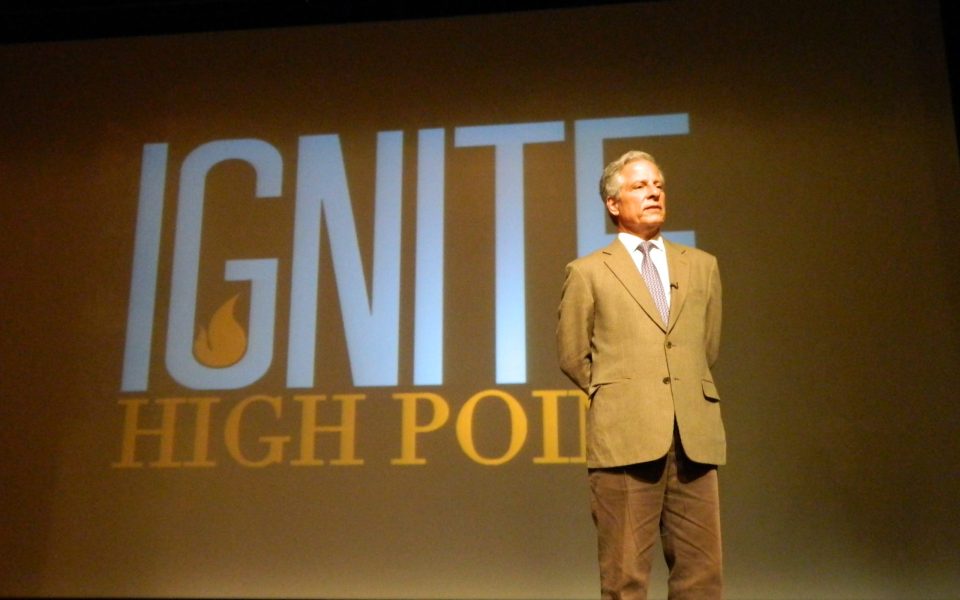by Jordan Green
People who gripe about Greensboro being unable to get its act together or Winston-Salem being insular, or North Carolina generally turning the clock back might be surprised to learn that no less a personage than new-urbanist founder Andres Duany extolled the Triad during an appearance last week at High Point University.
“Fortunately for you, this is a very prosperous region,” he said. “It’s one of the winners of the 21st Century. There are not that many winners. You have a great airport. You have Raleigh setting the pace — the envy of the South. You’re very close to Raleigh. There’s a lot of natural beauty. The universities are glorious all over North Carolina.”
He specifically commended Greensboro, mentioning a meeting earlier in the day with a group of local developers.
“And they marched me right through the downtown from beginning to end, from nothing to great in one adult lifetime,” Duany said. “And that’s where people want to go now: Greensboro.”
Duany characterized Winston-Salem, Greensboro’s smaller but more dynamic neighbor to the west, as “charming.”
Far from being complementary, Greensboro and Winston-Salem’s recent successes are turning out to be a problem for High Point, Duany believes.
“High Point is not great, and is not becoming great in a state that requires it,” he said. “Because people are moving into North Carolina. They’re saying, ‘Where do I want to shop? There.’ ‘Where do I want to settle? I’m going to move there.’ ‘Where do I want to open a gallery? I’m not going to do it there.’ And this place is checking out very badly.”
As a metric of vitality, Peter Freeman, a local architect who has been working with Duany on the Ignite High Point project, displayed a graph showing that home values in High Point were lower than practically any other city in the state and a number of similar cities like Chattanooga, Tenn.; Roanoke, Va.; and Greenville, SC. And while home values in the other cities rebounded around 2011, in High Point they have continued to fall off after peaking in 2008. The point is that the same houses built in the same years have less value in High Point because the community has fewer amenities to give them appeal.
High Point is a most peculiar city.
In an era when cities are reinventing themselves for knowledge-based economies as industries like textiles in Greensboro and tobacco in Winston-Salem staggered to their knees, High Point is a rare company town. Except that the furniture market — owned in large part by investment funds that hold a similar stake in a competing concern in Las Vegas — is more like a demanding client.
The city is providing an excellent service as an events facilitator, with prime downtown real estate set aside for sellers to showcase their products, shuttle buses to ferry buyers around, police and parks departments ready at a moment’s notice to ensure that everyone has a safe and comfortable experience. In exchange for the services, the furniture market pays a fee — in this case, a significant share of the property taxes that finance the city. But if the city is a company and the furniture market is its primary client, it’s easy to wonder if the shareholders (the citizens) are getting a fair share of the profits.
The furniture market monopolizes downtown High Point. And because downtown property owners can earn far more money leasing real estate for showrooms twice a year than for year-round retail, restaurants and housing, there is nothing for people who live in High Point to do downtown.
“We get a downtown, and we fill it with the shops that are necessary,” Duany said, explaining his typical role as a consultant and urban planner. “There are no shops available. There is nothing. Honestly. What am I supposed to work with? And so we came up with more radical things that are actually very cool. And because they’re very cool — they’re so unusual that it’s really confused people. We have to outdo ourselves because the normal is not possible.”
The normal would be creating a “main street” experience. But High Point residents are already availing themselves of two excellent “main street” experiences nearby — West Fourth Street in Winston-Salem and South Elm Street in Greensboro. The four radical ideas proposed by Duany — using shipping containers to create a provisional retail infrastructure, establishing a makers campus in the shell of the old Oak Hollow Mall, a “pink code” of relaxed regulation and an urban playground known as the Pit — never really received a hearing.
Two of the most anodyne proposals in the master plan developed by Duany and Freeman — making North Main Street more pedestrian friendly by slowing down auto traffic and establishing a green in front of the library for farmers markets, concerts and other gatherings — have been ferociously derided by a vocal cohort of citizens and nitpicked to death by council.
Duany admitted that the project is not going well.
“There’s this one thing that I need you to understand because it’s the bumper sticker that’s defining the entire [project], which is the road dieting of North Main Street,” he said. “I need you to understand both how easy it would be to do it, and how trivial it is. Because it’s both easy and trivial, and yet it’s consuming all the oxygen in the room.”
Join the First Amendment Society, a membership that goes directly to funding TCB‘s newsroom.
We believe that reporting can save the world.
The TCB First Amendment Society recognizes the vital role of a free, unfettered press with a bundling of local experiences designed to build community, and unique engagements with our newsroom that will help you understand, and shape, local journalism’s critical role in uplifting the people in our cities.
All revenue goes directly into the newsroom as reporters’ salaries and freelance commissions.


Leave a Reply